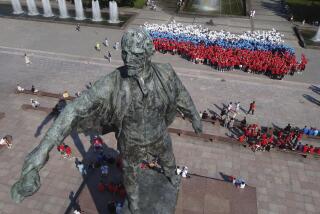Moscow’s Puzzle Is How to Motivate the Soviet Worker
- Share via
First there was glasnost and perestroika. Now the latest buzzword in Soviet intellectual circles is uskorenie-- the goal of accelerating economic growth. Perestroika is the engine of uskorenie, and it is already threatening to run out of steam. In a highly publicized speech to industrial workers at Communist Party headquarters last week , President Mikhail S. Gorbachev stated the reason: “The policy of perestroika will bog down if we fail to rally people to its cause.” Translation: Perestroika is bogged down and impassive workers are to blame.
Gorbachev’s speech should be a clear message for Western pundits who have been speculating about the strength of his position. With most of the ruling Politburo--including the discontented conservatives--literally standing behind him, he explicitly denied that there is any immediate threat to his presidency. His real concern is that Soviet the workers are unconvinced and unmotivated by perestroika. Gorbachev’s pressing challenge--and his only legitimate hope--lies in finding a way to motivate a work force that may be vaguely supportive of his goals, but is lacking in the political and economic experience to identify with, much less take specific action to implement, them.
On a recent trip across the Soviet Union, we observed some of the basis for Gorbachev’s frustration. All of the Soviets we talked with believed that perestroika and uskorenie were necessary, worthy ideas. But only the intellectuals, who have benefitted from greater freedom under glasnost, expressed any sense that daily life had actually changed. Most others characterized the reforms as “talk,” and it is likely to stay that way for the foreseeable future.
The workers we talked with were at least willing to recognize that the No. 1 problem is poor productivity. But the overwhelming majority tended to lay blame on almost anyone but themselves. The explanations were in the nature of “Stalin eliminated the most productive citizens” and “Gosplan (the government’s centralized planning authority) generates too many orders for useless products and not enough orders for much needed products.” Notably absent was any reference to the worker alcoholism, absenteeism and general lethargy that continue to cripple factories and other workplaces.
That the workers recognize neither their share of responsibility for the economic woes, nor the critical role of the individual in improving productivity, is not surprising. Today’s Soviet work force is borne of a system that for generations treated the individual as little more than a meaningless cog in the wheel of production.
The Russian Revolution was supposed to result in a “dictatorship of the proletariat,” in which, at least according to the leaders’ rhetoric, the workers would exercise some political choice and be the master of their own economic destiny. But by 1918, less than a year after the revolution, Lenin had already judged that the proletariat was not ready to be its own dictator. Although he implemented some market reforms designed to offer economic incentives in the early 1920s, Lenin did not permit the development of political institutions and practices necessary to move his economic program beyond the realm of ideas. Instead, the Central Committee stripped the individual of virtually all power by establishing the Communist Party as the vanguard of the revolution on behalf of the masses. The phrase “dictatorship of the party” officially replaced “dictatorship of the proletariat.” The dictatorship of the party soon became the dictatorship of Lenin, a situation brutally institutionalized by Stalin and continued until Gorbachev.
This centralization of political and economic power has at best discouraged, and at worst viciously punished individual initiative and innovation. Having endured decades of powerlessness and alienation from the basic decisions that affect their working lives, the Soviet people seem numb. Most appear to have given up questioning certain “basic facts”: The party and the leader dictate terms of production. The people produce what they are told to and receive what the leadership decides to send their way. Problems are solved by some agency in Moscow, not by the assistant plant manager in Irkutsk.
Suddenly Gorbachev is changing the rules. He is telling workers that poor productivity is their problem, and that they, not Moscow, are responsible for improving performance. He is not only inviting but demanding individual participation and initiative. The talk is of a new relationship between the state and civil society, in which individuals can have an economic stake and make a difference.
The workers deserve and will need much cajoling. Even before the revolution there never was a tradition of individual economic enterprise. Gorbachev must invent, not just reawaken, the entrepreneurial spirit.
He can start chipping away at chronic passivity by offering some short-term incentives. The Soviets are borrowing billions of dollars from Western banks. By placing imported consumer goods financed with these loans on Soviet shelves, Moscow can showcase some of the potential benefits of harder work and improved productivity. Holding out the goal of a convertible ruble might also stimulate participation inasmuch as it implies that the workers might one day be able to spend some of their 300 billion stockpiled rubles on coveted Western products.
All of this, however, would unlikely be enough to produce a watershed transformation in worker attitudes. Painfully aware of this, Gorbachev has introduced the concept of “reunification of power and production.” He seems to be contemplating the development of a decentralized democracy in which crucial economic and political decisions are made in plants, towns and cities, rather than in Moscow. If this is pursued seriously, it would reinforce what is so far only talk of worker participation with institutions essential to guarantee that such participation is meaningful.
The idea evokes a truly dignified role for the individual in the production process, for the first time in Soviet history. It may yet be the most provocative product of perestroika, but it is only a bare necessity on the road to uskorenie.
More to Read
Sign up for Essential California
The most important California stories and recommendations in your inbox every morning.
You may occasionally receive promotional content from the Los Angeles Times.










